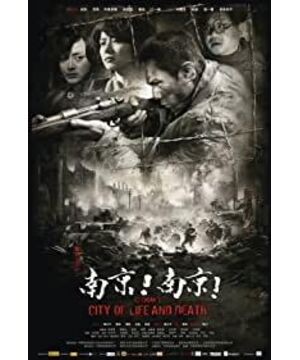At present, the topic of this film has cooled down, and the film's box office has also made a lot of money. The smart Director Lu should plan his next film. I always watch a movie after the noise has subsided, because this way I can put aside the subject matter and focus on the movie itself; I can only talk about the movie without talking about national humiliation.
At the beginning of the film, the shots were given to the Japanese army siege and the national army infighting. I thought this would be a documentary-style film. When I saw Lu Jianxiong played by Liu Ye and they suddenly shouted "China will not die" when they died, I knew, no, the content in the footage was not faithfully recorded, but was always ready to stir up emotions at the director's request. . Corresponding to this scene, Xiao Jiang and others, played by Jiang Yiyan, volunteered to be comfort women for the Japanese army, and spared no effort in sensationalizing. I knew it was sensational, and it was rather stiff, and my eyes were still wet. On the issue of sensationalism, I can understand the director. When shooting this subject matter, it is very difficult to control himself not to be sensational! However, since the director chose to take the sensational route, the film needs to have a main line and an inner force that continues to promote the development of the film. But no. The result is that the style of the film is split before and after, and more importantly, the film's perspective is messy.
The perspective of the film is carried out in the alternation of perspectives of China and Japan, and the shots of the two sides are basically half and half. There are many main characters in China, and they appear one after another, and the relays usually lead for a few minutes. Only Mr. Tang, played by Fan Wei, is barely a clue character. The fate of their family constitutes an important element to promote the development of the film for a period of time. . Compared with Mr. Jiang played by Lu Jianxiong and Gao Yuanyuan, who are clueless, this Mr. Tang is still fuller and more real. But in the end, he stayed by himself in order to let Rabe's other entourage leave, and his image instantly became taller, but thinking that he had told the Japanese that there were wounded Chinese soldiers in the safe zone in order to protect himself and his family, this originally seemed The more real people also became less believable. After he died, the baton was passed to Xiaodouzi, and whether he survived became a new suspense. But in the passing of the baton, the perspective changed again and again, becoming more and more chaotic, and when Xiaodouzi took over the baton, it was completely out of control.
The protagonist of the Japanese side is Kadokawa, and he is also the only character who runs through the entire film. His psychological journey constitutes the driving force of this side for the development of the film. But although he is consistent, he is isolated from the film, especially with the Japanese side. He is a Japanese soldier who retains his humanity, in the face of killing, he will be afraid; he will be homesick; after giving the first time to a comfort woman named Yuriko, he will want to marry her; Yuriko and looking like her The death of the woman will make him greatly stimulated. But apart from him, the Japanese side is more of a display of atrocities against the Japanese. As a result, the character of Kadokawa appears nondescript because it is out of tune with the background he is in. His personal growth and even his final destruction are basically two stories from the film. The director hopes to show this human tragedy more objectively, but if you don't think about the reasons behind the massacre and the perverted behavior of Japanese soldiers, it is meaningless to focus the camera on individual soldiers whose conscience is not clear. Kadokawa's last Suicide also seemed unconvincing. I would like to say a few words about Kadokawa's suicide. The director is really pushing too hard here. When I saw Kadokawa's performance near the end of the celebration, I thought that he would become firm in such a ceremony and become a killing machine like his comrades. If the movie was shot like this, I would at least add one ★.
In this way, in the constant switching between the chaotic perspective on the Chinese side and the weak perspective on the Japanese side, this movie has become a complete mess, and I don't know what the director wants to show.
The film is in black and white, reminiscent of "Schindler's List" and "Here Comes the Devil." The former is a classic of film history, while the latter has encountered a ban and a lot of saliva, but in my opinion, it is the best model for expressing the War of Resistance Against Japanese Aggression and Chinese humanity. The reason why these two films are excellent is that emotional restraint and perspective are very important, especially the latter. The audience is always observing with the protagonist's eyes and thinking with the protagonist's brain, so they can share the same fate with the protagonist. The clutter of the film's perspective makes the audience often at a loss, not knowing who to care about, so they have to pay attention to the shock brought by the subject itself, which may make the audience ignore the attention to the film. This is the cleverness of Director Lu's choice of this theme.
View more about City of Life and Death reviews










